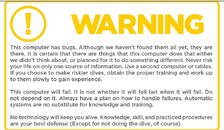The tables are a quantitative measurement of decompression in meters and pressure.
No. The tables are a simplification of models done with depth/pressure and time. They were developed as a (relatively) easy way for divers to stay on the safer side of things. Originally from studies done, then the different agencies tweaked them a bit for additional conservatism.
And what do you think the computers are doing? They are measuring pressure and time and making calculations throughout the dive about what might be happening with the diver's tissues. They can't know for sure what is going on with the diver's body, but neither can the tables.
The world is changeable and no computer can calculate what awaits me around the bend in the road!
You are right, the world is changeable (changing?). Yet you seem to argue the other way. The diving world has largely moved on from tables and has embraced computers. If diving with a computer instead of tables was as dangerous as you seem to think, then I would expect that the accident statistics would show a significant increase in DCI. Yet, everything I've seen doesn't support your hypothesis.
My advice: after looking at the computer, listen to your own ass
This might be the only correct statement I've read from you in this thread. You are absolutely right. No dive computer, dive table, or rule of thumbs can predict what is actually going on in the diver's body. The diver needs to use their head (assuming not permanently inserted in their ass) to decide what is safe for them. The computer, table, etc. are only tools that can provide the diver with information that could help in a decision making process.
I first learned to dive using a dive computer. My first 100 or so dives were done without a computer. I just consulted the tables. I still have my original OW table and my Nitrox table, but haven't used them to plan or execute a dive in a real long time. I've used computers since then. They are just a lot more convenient, and can actually take into account some level of changing conditions on a dive. In real-time.
For example, suppose a diver goes a bit deeper than their planned depth. It shouldn't happen, but I've read enough stories to know it happens all the time. They got a bit distracted following the reef line, and didn't pay close enough to their depth. The diver that planned with the table (that's up top on the boat) may have a bit of a dilemma. Are they still within NDL, or do they have a stop they should be taking. Unless they've memorized the tables, I guess they'll find out on the boat. For the diver with a computer, they will know whether they have exceeded NDL, or if they are still OK to continue. They have an updated plan of how to get safely to the surface.
Divers should be taught the basis of what happens during a dive. They need this to be safe. This can be accomplished with the accompaniment of tables or through the use of a computer. More often than not it's the computer today. When my daughters were first learning, I was a bit surprised that there wasn't as much of a focus on tables as when I first learned. Then I thought about it and realized I'm OK with it. The world has changed. So many aspects of life today are different than they were years ago. Why should scuba diving be different?




